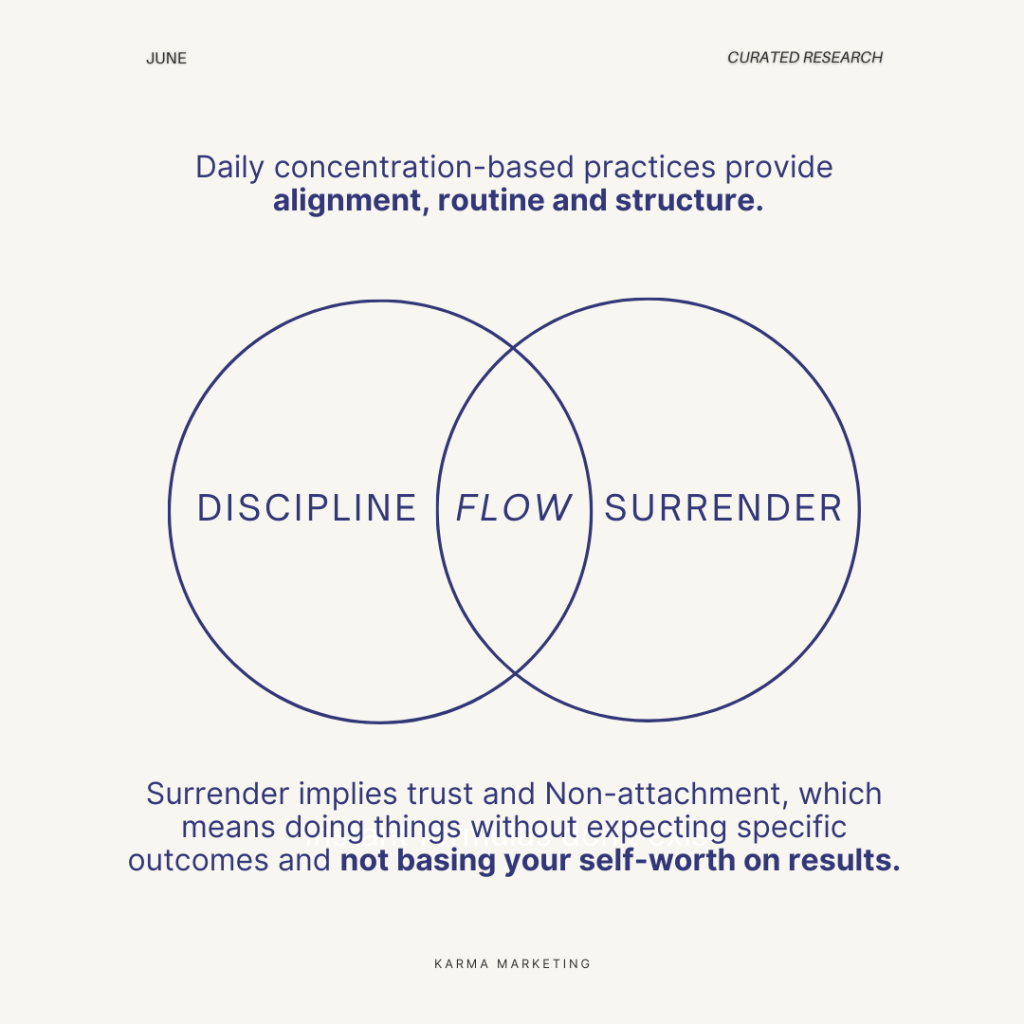Discipline is not as straightforward as it sounds. They say commitment promises success, yet we sometimes lose ourselves in the process.
And we’ve all been there – pouring endless hours into pursuing a goal, only to feel more drained and distant from happiness once achieved. Our intense focus on our goals can become so consuming that any unexpected challenges can cause everything to fall apart.
What is this paradox? Why do even our best efforts sometimes backfire? When we push without pause to the finish line, do we ever stop to consider why we started this race in the first place?
All these questions, and we think the answers lie in a 30-minute TED Talk from someone famous. Trapped in a cycle of striving, it’s easy to forget our deeper motivations beneath surface cravings for money, status or praise. Externally defined success leaves little room for inner wisdom or flexibility.
But could the discipline we seek feel less like a burden if we directed our questioning inward as much as outward? What if the key to contentment through discipline lay not in doubling down on self-criticism, but loosening our grip just a little?
In this article, we’ll explore how incorporating spiritual-inspired philosophy into daily practices can help resolve the apparent contradiction between structure, growth and well-being. By balancing effort with reflection, and outcomes with presence, a sustainable rhythm gently carries us toward wisdom that worldly victories alone cannot satisfy.
Introduction to Self-Inquiry
We’ve heard it countless times – that success comes through persistence and grit. But why then, after achieving goals through punishing effort, do we sometimes feel further than ever from satisfaction?
They say hard work is the key to success, but they often overlook how it can lack contentment. When discipline becomes a rigid routine divorced from reflection, even our greatest victories leave an aftertaste of emptiness. Absorbed in outward achievements, we overlook nourishing the inner roots of happiness.
Could the routine contain more space for presence than productivity alone?
In yoga philosophy, hard work doesn’t necessarily mean relentless striving for external success. Instead, it emphasizes discipline (tapas) as a form of self-improvement.
How often do our days pass in a blur, busy with tasks but not truly present? We rush from one thing to the next without stopping to notice each moment. The yoga practice of tapas is about focused, mindful effort that respects one’s limits and seeks balance.
Tapas combines daily routines with inner reflection. Through committed practices, we craft space for self-inquiry. Self-inquiry, or Atma Vichara, is a profound practice within yoga and spiritual traditions that involves exploring the nature of the Self.
At its core, self-inquiry involves asking the fundamental question, “Who am I?” This question encourages a deep exploration of one’s true identity beyond physical appearance, thoughts, emotions, and roles. To illustrate the essence, we recommend trying this exercise: THE PRACTICE OF SELF INQUIRY – “WHO AM I?” by Ram Dass.
Yogic philosophy teaches that true wisdom arises from inquiry, not answers. It is the continual questioning of our limits and assumptions that allows fresh insight to emerge. By regularly reflecting on not just what we think, but how and why, a more faceted awareness awakens.
Understanding Detachment
There is no wrong question during the practice of self-inquiry, but sometimes your ego might tempt you with misleading answers. For instance, after years of exhausting hard work, you might ask yourself, “What is it that I truly want?” Your ego might respond with: recognition from your boss or financial freedom.
Well, keep in mind that we are sometimes oblivious to when our desires are all about worldly success. While recognition and financial freedom are goals we can strive for, they are ultimately beyond our control.
Referencing the Hindu philosophy, desire is like a hamster wheel. The more you have, the more you will continue to desire. If you get what you want, you’ll just keep wanting more. If you don’t get what you want, you’ll remain dissatisfied. Either way, the cycle of desire keeps you from true contentment.
Detachment, or Vairagya in yogic philosophy, is a fundamental concept that involves letting go of attachments to outcomes, material possessions, and even our own desires. It doesn’t mean becoming indifferent or uncaring; rather, it signifies a balanced approach to life where one remains engaged in actions without being bound by the results.
Here’s a deeper look at the essence of detachment:
1. Focusing on Growth instead of Reward
It’s natural to desire success and recognition, but there’s a difference between seeking them and expecting them. Detachment guides us to focus on self-improvement, not to become better than your rival, but better than who you were yesterday. Finding contentment in our own growth is the biggest reward of all.
2. Embracing Impermanence:
Everything in life is transient—our possessions, relationships, achievements, and even our emotions. Detachment helps us to understand and accept the impermanent nature of existence. By doing so, we reduce our suffering when things inevitably change or do not go as planned.
3. Finding Inner Peace:
When we let go of our attachments, we cultivate inner peace and stability. This doesn’t mean we stop caring about our goals or loved ones; instead, we engage with them from a place of inner security rather than dependence.
Detachment is essentially about achieving a balance—remaining fully engaged in life while not becoming overly attached to specific outcomes or material possessions. It’s akin to practicing gratitude, where you focus on what you have rather than what you lack.
While you may have heard from countless TED Talks that changing your perspective is the key, we recognize that life isn’t merely something we observe; it’s something we experience. We push through, and break down, and grab a cup of coffee, and try again. So, while shifting your perspective may not pay the bills, it certainly eases the mind to acknowledge how far you’ve come.
State of Flow: On the Practice of Discipline without Attachment
Now that we’ve discussed discipline and detachment, let’s explore how disciplined practices and non-attachment principles complement each other in daily life.

Flow is the harmonious balance between discipline and surrender, where one is fully engaged in an activity, yet also open and adaptable to the natural course of events. It requires focus and dedication, coupled with a willingness to let go of control and accept outcomes, leading to a state of complete absorption and fulfillment.
What I love about this concept is that it teaches us that true fulfillment comes not from rigid control or passive acceptance but from a state of active engagement with life, where we are fully present, immersed in the moment, and open to whatever unfolds.
Say, we’re on a self-improvement mission that needs a tight exercise routine to master, like learning a new language. It’s a whole personal journey where we can only count on ourselves. Missing 1 day of practice will throw us off, so we set aside practice time each day to focus on it.
Self-inquiry plays a crucial role here by igniting genuine passion. We must genuinely want to learn that language. It’s necessary to imagine the places we can visit, the people we can connect with once we master the conversational skills for it. Make it a treat for the soul, instead of an obligation for the mind.
Another key tip is to match the level of challenge to your skill level. This balance prevents boredom (when the challenge is too low) and anxiety (when the challenge is too high), creating optimal conditions for flow.
When you find contentment in the journey itself, the mission becomes a gift rather than a chase. Trusting in your abilities and the natural course of events allows you to be carried by the current of the activity, hence the term “flow.”
Afterthought
There is certainly more to cover, but no words can thoroughly tell you what self-inquiry truly is. While I could end with clichés about the power of discipline lying in both structure and flexibility, we both know that this would barely scratch the surface of how clarity can truly transform our lives.
And it’s not even a magic pill that promises eternal peace. Rather, it is a practice that reveals opposing views, much like wearing 3D glasses with red on one lens and blue on the other. Life would appear beautifully confusing, as it actually is. And the joy would lie in seeking sense, over and over again, until it all suddenly clicks.
One of my favorite mantras is, “Wisdom appears in contradiction to itself,” highlighting the paradoxical nature of life’s lessons—frustrating yet liberating in their cyclical nature.
I highly recommend starting your journey with “The Ultimate Guide to Ramana Maharshi’s Self-Inquiry” by Akilesh Ayyar.
In fact, I’d like to borrow some great words from him as a closing statement:
“Self-inquiry is ultimately to be engaged in at every waking moment.”
Akilesh Ayyar
Karma Wisdom | Curated research written by Anya Junor
